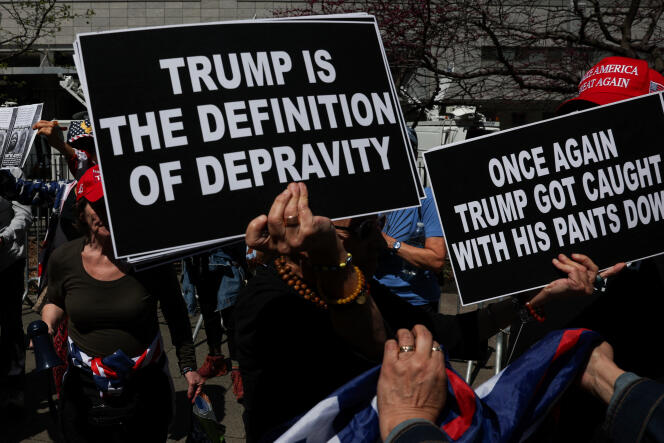


On Monday, April 15, no fewer than 96 Manhattan residents with court summonses made their way through the crowd gathered outside the New York City courthouse to the hyper-mediatized 15th-floor courtroom. As they entered, Donald Trump's gaze turned in their direction, as he tried to catch a glimpse of the New Yorkers who could decide his fate in the Stormy Daniels hush money case.
The former president of the United States, the first in history to become a defendant in a criminal trial, is accused of paying the pornographic film actress not to make public a past relationship before the 2016 presidential election.
To protect their anonymity, these potential jurors – the first to appear among the 500 or so residents chosen by lot – were given only an identification number. Faced with the risk of pressure, Judge Juan Merchan decided that the names of the 12 jurors selected and their six alternates would not be made public.
So far, seven jurors have been chosen. This stage of the hearing, possibly decisive in the outcome of the trial, is already shaping up to be a headache, due to the notoriety of the defendant and the polarization of the American political climate, less than seven months away from the presidential election. Finding impartial, unbiased jurors for the case could take several days or even weeks.
Under the procedure, jurors may first choose to recuse themselves, if they feel unable to be fair and impartial during the trial. They may also invoke certain professional or family obligations, or physical inability to attend the entire trial. Normally, these reasons must be justified, but Judge Merchan, faced with the unprecedented scale of the trial, has decided to dismiss without debate those who express any doubts.
Those who remain will be subjected to a battery of questions – the judge has put 42 forward in all. One by one, they will be questioned about their age, education, professional occupation and family life. While their political affiliation and votes in past elections will not be addressed, they will be asked how they get information, which radio stations they listen to, whether they have read the former president's books, or have links with pro- or anti-Trump organizations, with the QAnon movement, the Proud Boys or even "Antifa" collectives. They will also have to gauge their pre-existing opinions on Trump, the Daniels case, and the way he is treated by the justice system.
"Contrary to defense counsel's arguments, the purpose of jury selection is not to determine whether a prospective juror likes or does not like one of the parties," the judge insisted in an April 8 letter, dismissing the difficulty cited by Trump's lawyers in finding a fair jury in the Democratic stronghold of Manhattan, which voted 86.7% for Joe Biden in 2020. It's more a question, the judge continued, of whether the juror will be able to "set aside any personal feelings or biases and render a decision that is based on the evidence and the law."
In practice, however, it's a matter of each side targeting the profiles likely to tip the decision in their favor. Lawyers will work to detect unspoken bias, hidden agendas; to sense which jurors might be sympathetic to their arguments; to establish a relationship of trust with them, lists the Washington Post.
More concretely, according to information from the New York Times, Trump's lawyers would be looking for "a jury composed more of younger Black men and White working-class men, particularly public employees like police officers, firefighters and sanitation workers." As the jury's decision must be unanimous, the defense would only need to include a juror absolutely convinced of Trump's innocence to save him from conviction.
Conversely, to disqualify supporters of the former Republican president, prosecutors should prefer "more educated voters from Democratic neighborhoods," be on the lookout for those "who consume news from sources like MSNBC" or listen to comedian and "Late Show" host Stephen Colbert, wrote the newspaper.
In order to keep only the potential jurors they prefer, each side will be entitled to 10 "peremptory challenges," which allow them to dismiss a prospective juror without providing any explanation. In 1986, however, the US ruled that the use of these "trump cards" to exclude people from a given group (on the basis of ethnic origin, gender, etc.) was unconstitutional. Lawyers and prosecutors will also be able to request the disqualification of other jurors for cause, presenting their reasons for believing that the jury will not be fair or impartial.
In the courtroom on Monday, when the judge asked the 96 jurors who among them did not consider themselves impartial, many hands went up. Some 60 of them were dismissed.
On the stand, the judge's questions sketched the contours of varied profiles among those remaining, from an NPR radio listener believing that "no one is above the law," to a creative director who enjoys hiking, cooking and playing with his dog. "Yes," a woman admitted, according to US media, when responding to the judge who asked if she had any "strong opinions or firmly held beliefs about former president Donald Trump" that would prevent her from being impartial. "It just wasn't possible for me," she reportedly blurted out as she left the courtroom. At the end of the first day, none of the 96 jurors present had been retained.
Translation of an original article published in French on lemonde.fr; the publisher may only be liable for the French version.
